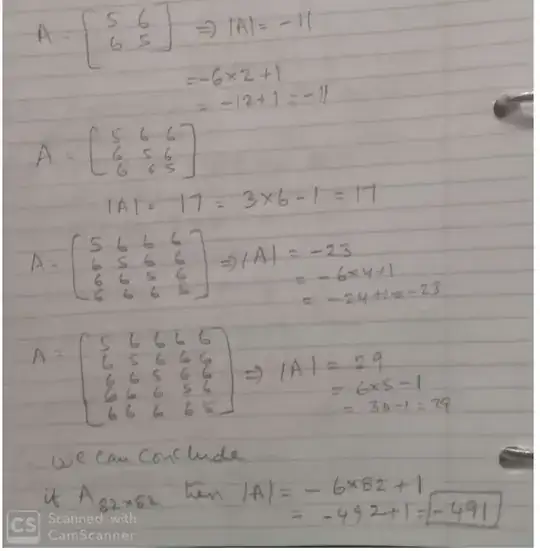a matrix where every entry is $1$ has eigenvalues $0,0,0,0,..., 0,n.$ For all entries $6,$ we get $0,0,0,0,..., 0,6n.$ Then subtract $I$
For Sylvester's Law of Inertia...the outcome confirms that $n-1$ eigenvalues are zero, then a single positive eigenvalue. We can check that the nonzero eigenvalue is $n$
$$ Q^T D Q = H $$
$$\left(
\begin{array}{rrr}
1 & 0 & 0 \\
1 & 1 & 0 \\
1 & 0 & 1 \\
\end{array}
\right)
\left(
\begin{array}{rrr}
1 & 0 & 0 \\
0 & 0 & 0 \\
0 & 0 & 0 \\
\end{array}
\right)
\left(
\begin{array}{rrr}
1 & 1 & 1 \\
0 & 1 & 0 \\
0 & 0 & 1 \\
\end{array}
\right)
= \left(
\begin{array}{rrr}
1 & 1 & 1 \\
1 & 1 & 1 \\
1 & 1 & 1 \\
\end{array}
\right)
$$
$$ Q^T D Q = H $$
$$\left(
\begin{array}{rrrr}
1 & 0 & 0 & 0 \\
1 & 1 & 0 & 0 \\
1 & 0 & 1 & 0 \\
1 & 0 & 0 & 1 \\
\end{array}
\right)
\left(
\begin{array}{rrrr}
1 & 0 & 0 & 0 \\
0 & 0 & 0 & 0 \\
0 & 0 & 0 & 0 \\
0 & 0 & 0 & 0 \\
\end{array}
\right)
\left(
\begin{array}{rrrr}
1 & 1 & 1 & 1 \\
0 & 1 & 0 & 0 \\
0 & 0 & 1 & 0 \\
0 & 0 & 0 & 1 \\
\end{array}
\right)
= \left(
\begin{array}{rrrr}
1 & 1 & 1 & 1 \\
1 & 1 & 1 & 1 \\
1 & 1 & 1 & 1 \\
1 & 1 & 1 & 1 \\
\end{array}
\right)
$$
$$ Q^T D Q = H $$
$$\left(
\begin{array}{rrrrr}
1 & 0 & 0 & 0 & 0 \\
1 & 1 & 0 & 0 & 0 \\
1 & 0 & 1 & 0 & 0 \\
1 & 0 & 0 & 1 & 0 \\
1 & 0 & 0 & 0 & 1 \\
\end{array}
\right)
\left(
\begin{array}{rrrrr}
1 & 0 & 0 & 0 & 0 \\
0 & 0 & 0 & 0 & 0 \\
0 & 0 & 0 & 0 & 0 \\
0 & 0 & 0 & 0 & 0 \\
0 & 0 & 0 & 0 & 0 \\
\end{array}
\right)
\left(
\begin{array}{rrrrr}
1 & 1 & 1 & 1 & 1 \\
0 & 1 & 0 & 0 & 0 \\
0 & 0 & 1 & 0 & 0 \\
0 & 0 & 0 & 1 & 0 \\
0 & 0 & 0 & 0 & 1 \\
\end{array}
\right)
= \left(
\begin{array}{rrrrr}
1 & 1 & 1 & 1 & 1 \\
1 & 1 & 1 & 1 & 1 \\
1 & 1 & 1 & 1 & 1 \\
1 & 1 & 1 & 1 & 1 \\
1 & 1 & 1 & 1 & 1 \\
\end{array}
\right)
$$
